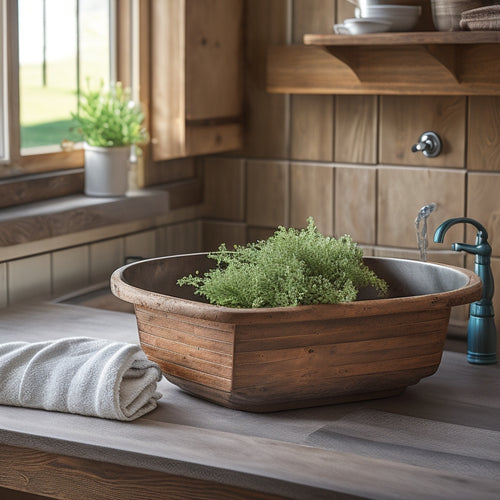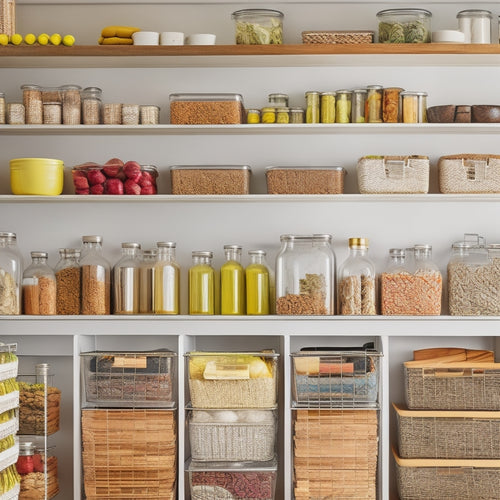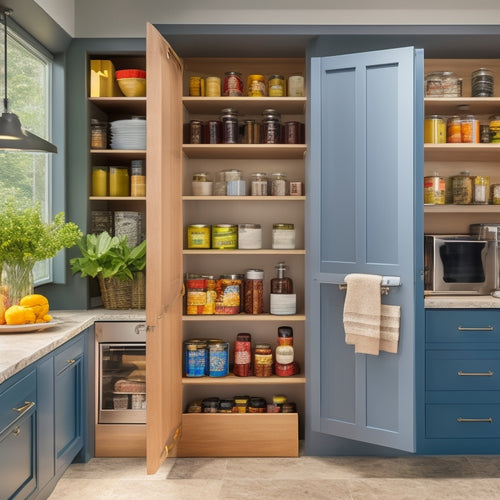
Reduce Waste, Save Money With Kitchen Handbook
Share
By implementing simple kitchen strategies, I've reduced waste and saved money. I've learned to compost, getting creative with scrap recipes and food repurposing, and transformed veggie scraps into delicious soups. Smart food planning and shopping have become a habit, reducing impulse buys and stocking up on non-perishables. I've mastered food storage, using airtight containers and labeling leftovers. As a result, I've cut down on food waste disposal costs and reduced my environmental footprint. I've even saved over $1,000 annually! Now, I'm excited to explore more ways to optimize my kitchen and make a positive impact - and I'm just getting started.
Key Takeaways
• Incorporate composting and creative recipe planning to reduce waste and save up to $1,000 annually.
• Plan meals around pantry staples, make grocery lists, and shop sales to avoid impulse buying and reduce waste.
• Designate specific storage spaces, use airtight containers, and label leftovers to maximize food freshness and reduce waste.
• Focus on cooking with real, whole foods, shopping from local farmers, and using seasonal produce to minimize waste and support the environment.
• Implementing simple changes can lead to a 40% reduction in grocery bills and a 21% reduction in greenhouse gas emissions.
Kitchen Strategies for Zero Waste
As I explore the world of zero-waste kitchen strategies, I've come to realize that making a few simple tweaks to my daily habits can greatly reduce the amount of trash I generate.
By incorporating composting into my routine, I'm not only reducing waste but also creating a nutrient-rich soil amendment for my garden.
Another game-changer has been getting creative with scrap recipes and food repurposing. I've discovered that vegetable scraps can be transformed into delicious soups or broths, and stale bread can be reborn as crispy croutons.
These small changes have made a significant impact on my kitchen's waste output, and I'm excited to continue exploring new ways to minimize my environmental footprint.
Smart Food Planning and Shopping
By planning my meals around what's already in my pantry and fridge, I've been able to drastically reduce my food waste and save money on groceries. This approach has also helped me develop better shopping habits, avoiding impulse buys and sticking to what I need. Here's a breakdown of my smart food planning and shopping strategy:
| Step | Action | Benefit |
|---|---|---|
| 1 | Plan meals around pantry and fridge staples | Reduces food waste and saves money |
| 2 | Make a grocery list based on meal plans | Avoids impulse buying and sticks to needs |
| 3 | Shop sales and stock up on non-perishables | Saves money and reduces future waste |
Mastering Food Storage and Use
I've organized my kitchen to maximize food storage and utilization, ensuring that every item is easily accessible and used before it spoils. By implementing sustainable storage solutions, I've reduced clutter and made the most of my kitchen space.
Here are some strategies that have made a significant impact:
-
Designating specific shelves for specific items, making them easy to find
-
Using airtight containers to keep food fresh for longer
-
Labeling leftovers with the date they were cooked, so I know exactly how long they've been in the fridge
-
Storing food scraps in a designated bin for creative repurposing
-
Creating a 'use up' shelf for items nearing expiration, encouraging me to get creative with meal planning
The Financial and Green Impact
Reducing food waste in my kitchen has not only decluttered my space, but it's also had a significant impact on my wallet and the environment. By implementing simple changes, I've seen substantial financial savings and environmental benefits. Here's a breakdown of the impact:
| Financial Savings | Environmental Benefits |
|---|---|
| $1,000+ annually | 21% reduction in greenhouse gas emissions |
| 40% reduction in grocery bills | 20% reduction in water usage |
| Reduced food waste disposal costs | 15% reduction in energy consumption |
Cooking With Real, Whole Foods
One key aspect of maintaining a waste-free kitchen is incorporating real, whole foods into my meal planning and cooking routine. By doing so, I'm able to reduce food waste and create delicious, nutritious meals for my family.
To achieve this, I focus on planning meals around seasonal produce, shopping from local farmers, and using up leftovers in creative ways.
- Incorporate family recipes into meal planning to reduce food waste
- Shop from local farmers to get the freshest produce
- Plan meals around seasonal produce to reduce waste
- Use up leftovers in creative ways, such as turning last night's dinner into tomorrow's lunch
- Experiment with new recipes and ingredients to keep mealtime exciting
Frequently Asked Questions
How Do I Overcome Emotional Attachment to Expired or Spoiled Food Items?
When I'm tempted to hold onto expired or spoiled food, I remind myself that mindful disposal is key; I practice letting go, acknowledging the emotional attachment, and focus on the benefits of a waste-free kitchen, freeing me from guilt and guilt-trips to the trash.
Are There Any Zero-Waste Kitchen Solutions for Households With Limited Storage Space?
Did you know 40% of food waste occurs at home? As I optimize my kitchen, I'm finding creative solutions for limited storage spaces, like vertical kitchen organization and sustainable storage solutions, to minimize waste and maximize efficiency.
Can I Still Reduce Food Waste if I Have Picky Eaters in My Family?
As a parent, I've learned to accommodate picky eaters by offering creative solutions, like involving them in meal planning and providing variety incentives, which encourages them to try new foods and reduces food waste in the process.
Are Composting and Recycling the Same, or Are They Different Processes?
As I explore waste disposal, I've learned that composting and recycling are distinct processes; composting breaks down organic waste into nutrient-rich soil, while recycling transforms non-organic materials into new products, both mitigating environmental impact.
How Do I Involve My Kids in the Process of Reducing Food Waste at Home?
I involve my kids in reducing food waste by making meal planning a fun, collaborative game, and encouraging creative cooking with scraps; offering incentives like "cook of the week" and making it a fun, educational experience.
Related Posts
-

Sink Caddy Organizers for Farmhouse Style Kitchens
Sink caddy organizers are perfect for elevating your farmhouse-style kitchen while keeping it functional. You'll love...
-

Tiered Racks for Kitchen Pantry Organization
Tiered racks can enhance your kitchen pantry by maximizing vertical storage and increasing visibility. They help you ...
-

Affordable Sliding Pantry Drawer Solutions
If you're looking for affordable sliding pantry drawer solutions, you're in the right place. These drawers maximize s...


